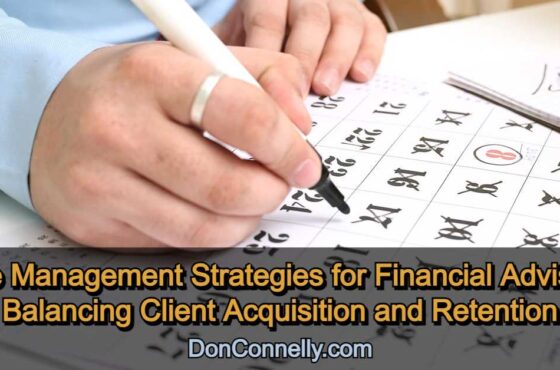Seven Things to Do to Set Yourself Up for Success as a Financial Advisor
 All Financial Advisors need a track to run on. That is, a set of activities that you know are productive, and that will continue to guide you on your path to success, even … and this is key… even if you don’t feel like working!
All Financial Advisors need a track to run on. That is, a set of activities that you know are productive, and that will continue to guide you on your path to success, even … and this is key… even if you don’t feel like working!
Here is a set of seven principles that will help keep you focused and moving along your path to the very top of our profession.
#1. Make sure your appointment book is always full.
I’m not exaggerating when I say this: Nothing happens without an appointment. Appointments with clients and qualified prospects are the lifeblood of our business. Especially in your first few years as a financial advisor, everything you do has to be focused on filling your calendar with appointments.
Everything else is trivial, compared to activities that put you ‘face-to-face’ (even virtually) or on the phone with qualified prospects that can sign checks.
The magic number to strive for: Three appointments a day, for the next week. That means hard, confirmed appointments where the prospect is fully expecting to discuss their financial situation and objectives, and how you can help them. That’s a very tall order and an admirable goal. You may not get three appointments each day, but you’ve got to reach for that goal. You will never become successful staying in your comfort zone.
Appointments “just to catch up over coffee” don’t count, unless they are already clients, and they expect to be asked for referrals. Appointments with your buddy at the networking group to “trade leads” don’t count, either.
Now, it’s very tough to book three solid appointments per day. Most people work very hard just to get to two. But don’t let up the prospecting until you have three each weekday lined up.
That’s 15 appointments per week. If you open accounts with a third of those folks, you have a good, good chance of making it.
Don’t worry if they aren’t the biggest accounts. As long as they fit your business model, it’s fine. If you’re meeting with 15 prospects per week, you’ll soon get your share. Fight, fight, fight, all day and every day, to book 15 appointments over the next week.
#2. Develop and rehearse your value proposition.
Your value proposition is a short, memorable statement that efficiently communicates who you help and how you help them. It also sets you apart from your competitors. Make sure it doesn’t just relate to money, but to their life goals, as well – both financial and non-financial. According to research from Pershing.com, 70% of consumers surveyed said it’s important for a financial advisor’s value proposition to tie in to their overall life goals, and not just their finances.
And yes, you have to rehearse it, so you know it cold. Practice it over and over, so you can say it in your sleep.
#3. Focus on your most valuable activity.
Everybody’s most valuable activity is different. For Advisors building a business, it’s focusing on generating appointments to fill that calendar! Your most valuable activity is whatever puts new clients and soon-to be clients in front of you so that you can help them achieve their goals.
Now, I know what your most valuable activity is not. It’s not writing blog posts, goofing around with financial planning software, or playing on social media, except for interacting with clients and prospects.
For most of you, your most valuable activity is picking up the phone, sending an email to request or confirm an appointment, or walking into a small business and asking for the owner. Every minute during the week you’re not sitting down with people and listening to their needs, you should be focusing on these activities. Later in your career, you can add scheduling routine annual or quarterly reviews to this list.
All the other stuff can wait until you’ve got three booked appointments a day for the next week (and a good start on the week or two after!)
Focus on things that fill your calendar with qualified appointments.
#4. Become a professional listener.
I can’t emphasize this enough: Soft skills will make or break you in this business. You cannot learn anything while you are talking. Successful Financial Advisors are professional listeners. The client will tell you what they want and need – if you’ll only listen.
You might need to ask a few leading questions to draw the client out. But each question should lead to an opportunity to do more listening.
When you’re in this process, quash your ego. Don’t even let it into the room. Your ego causes you to run your mouth and talk your way out of too many sales. Tell your ego to wait outside. Don’t interject your opinions at this point. Let the other person talk. Just listen, except to the extent you need to ask a clarifying question, or get the prospect to keep talking to give you more information that you can use to help them.
#5. Master the basics.
I’m all about executing the basics to perfection. Successful people become great at the basics and then they stick to the basics.
When I say, “the basics,” I’m not talking about technical skills. Those are important, but those aren’t the basics. The basics are those things you can do day in and day out to keep moving forward to accomplish your goals, and your clients’ goals as well.
Now, that’s easy to say. But it’s very hard to do. It takes a blue-collar mentality: Git ‘er done. Day in, day out. No exceptions. No excuses.
Do you have written goals? That’s a basic. Are they specific, and actionable, with a deadline? Do you check your progress regularly? Do you have someone who will hold you accountable?
Are you keeping your presentations simple? Too many advisors have too much math and theory in their presentations. Here are two careers saving tips:
- Assume the prospect skipped math class.
- Pick 2 or 3 simple stories and stick to them.
Finally, keep working hard. Don’t let up on your prospecting. Don’t let up on your marketing. That’s the difference between the million-dollar advisors and most people just getting by: The million-dollar advisors are not afraid of rolling up their sleeves and getting their hands dirty.
#6. Ask for the order.
If you want your prospects to become clients, you’ve got to ask. Too many people get gun shy at the moment of truth!
When you’ve had your initial interview, and it’s clear that you can help the client, and it’s clear to the clients that they will benefit from your help, you’ve got to close the deal.
Ask them to come aboard as your client! Ask them to act on your advice. It’s for their benefit, after all.
Don’t wait for them to make the first move. You’re not doing them a service by being weak at the close. Ask them to act on your advice. Simply asking for the order can make the difference between a 10% closing percentage and a 40% closing percentage.
In fact, go into every meeting with that as your goal. If you’re making a presentation and recommending an actionable solution, don’t count it as a kept appointment for the week unless you ask for the order!
Sometimes the answer will be no. Or it will be delayed for a bit, because you didn’t address the hidden objections first. But that’s ok. Keep making appointments, and keep asking for the order, day in and day out, and you’ll be fine.
#7. Create a repeatable process.
A repeatable process is one you can do every day, day in, day out. It’s your set of rails you can run the train on. No appointments this morning? No problem. Execute your prospecting process.
Everybody needs a routine. A routine adds structure to your life – especially in the morning.
As your business grows, your calendar will fill up. Repeatable processes are important because they will allow you to delegate non-core tasks.
That ability will be crucial to allowing you to grow even further.
Down the road, those repeatable processes will go a long way to making your business more valuable to sell.
Are you in your first five years as an advisor? Or are you past your five-year mark and feel like you’re stagnating? Watch this 4-minute video to learn how this training program can help you get back to the fundamentals and execute the basics to perfection.
See details and enroll today for $149!
24 video lessons. 24 exercises. A survival’s manual. And an enormous head-start on your competition. The 7 things featured in this blog post all have their own modules in this training program. Enroll now.



